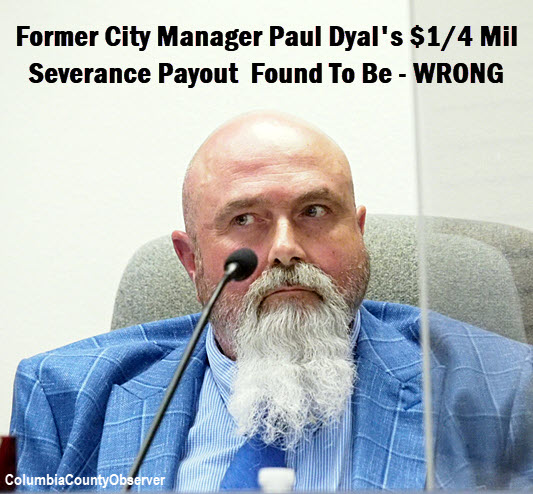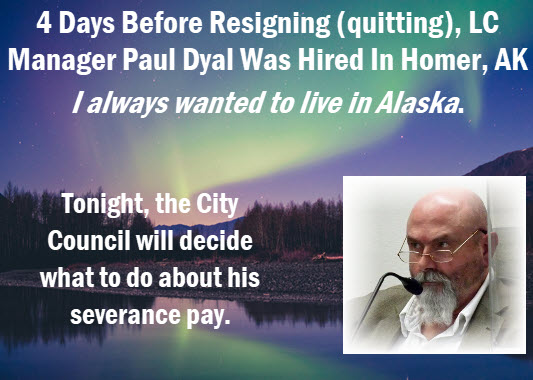Lake City: When a City Manager Voluntarily Quits, He Doesn't Get Severance. The LC Mayor and City Attorney Said, ‘Pay ‘em, anyway.’ A Legal Analysis Says – WRONG
February 8, 2025 5:20 am | 6 min read

 LAKE CITY, FL – For years, Lake City, FL, has
been the self-admitted laughing stock of Florida
to Alaska: meetings careening out of control,
backroom deals, blatant disregard of
commonsense, mendacity, sexual misconduct
coverup, FDLE investigations, employee lawsuits
against the City, and City Attorneys from La-La
Land.
LAKE CITY, FL – For years, Lake City, FL, has
been the self-admitted laughing stock of Florida
to Alaska: meetings careening out of control,
backroom deals, blatant disregard of
commonsense, mendacity, sexual misconduct
coverup, FDLE investigations, employee lawsuits
against the City, and City Attorneys from La-La
Land.
Don't want to read
the whole story: see Key Findings In a
Nut Shell and
Epilogue: a 50 word summary.
This story is about the investigation of a one-quarter-million dollar severance payout to former City Manager Paul Dyal, a Svengali-like character who, through a series of deals initiated in the backrooms, became the Lake City Manager for nine months and then had the City grant him a severance package worth a quarter million after he voluntarily resigned.
Background: beginning 4 days before City Manager Dyal resigned
In September 2023, four days before resigning from Lake City, Mr. Dyal was hired in Alaska. He never told anybody. Click the photo below for background and links.

Click the photo for background and links.
Photo: Mckayla Crump via Unsplash | Columbia
County Observer graphic
On May 6, 2024, inspite of mass confusion, the City Council voted to investigate investigating the $1/4 mil illegal Dyal severance package.
Two-and-a-half months later, on July 15, wrongly put on the City Consent Agenda, the City Council hired a legal consultant, Michael Cavendish, to investigate the City's payment of severance after Mr. Dyal quit.
Michael Cavendish:
Report on Former City Manager Paul Dyal's
Severance Payment
Mr. Cavendish’s investigation and legal opinions regarding the severance payments made to former City Manager Dyal outline several significant issues that raise concerns about the validity and legality of those payments. Long story short, as reported in the Observer many times, the City Council never authorized the payment to Mr. Dyal.
The total severance payments to Mr. Dyal included salary for 16 weeks (Mr. Dyal earned approximately $3,000 a week plus benefits); $127,207.96 (1,763.95 hours) for accrued sick leave; and $28,846.16 (400 hours) accrued vacation leave.
The 16-week salary payment was not part of Mr. Dyal’s Employment Agreement for a voluntary resignation. The lack of Council approval means the Council did not exercise its authority over these payments.
Mr. Cavendish points out that because the City Council did not approve the Separation Agreement and the payments, they are deemed invalid under the ultra vires doctrine, which means the action(s) was taken without legal authority.
Mr. Dyal’s payments for sick and vacation leave exceeded the limits set by the City's Personnel Manual, resulting in significant overpayments taken without legal authority.
According to the report, Mr. Dyal was overpaid $91,207.96 for sick leave and $5,769.16 for vacation leave.
Because the payments were unplanned expenses and not included in the City's budget, they needed to be approved by the City Council. They were not.
Previously reported in the Observer:
Mayor Witt signed off on the Agreement. Mayor Witt is an attorney and accountant. The Mayor claimed that he did not read the Agreement and that City Attorney Todd Kennon told him to sign it. During the final Council discussions regarding the Dyal Severance Agreement, Todd Kennon refused to speak on the Dyal Severance, leaving the Council without representation regarding the illegal payments by the City.
During the production of the Cavendish Report, Todd Kennon also refused to talk to Michael Cavendish, the Council’s reluctantly hired investigator of the Dyal Severance Pay issue, though eventually he did.
Mr. Cavendish found that while Mr. Dyal’s resignation was formalized through a Separation Agreement, the Agreement did not specify the amounts for sick and vacation leave, which led to overpayments due to miscalculations in the City Finance Department.
City Manager Dyal, the Svengali-like manager, forced the City’s experienced Finance Director, a CPA with years of municipal experience, out and replaced her with one not qualified for the position. This employee, who Mr. Dyal previously showered with a raise, never questioned the Dyal payments.
Mr. Cavendish reported Mr. Dyal resigned voluntarily after nine months.
The overpayments to Mr. Dyal totaled hundreds of thousands of dollars. The sick and vacation leave payments were automatically invalid because they weren't legal.
Mr. Cavendish found, and as the Observer had previously reported, the executed Separation Agreement was not presented to the City Council for approval; it lacked the necessary documentation and oversight, raising legal concerns.
Besides the legal concerns, the discrepancies between the Employment Agreement and the Separation Agreement highlighted procedural failures.
The Cavendish investigation points to serious legal and procedural deficiencies in how the City managed Mr. Dyal's resignation payments, suggesting that corrective actions are necessary to validate the payments and avoid potential recovery actions for overpayments.
The legal opinion regarding the Dyal Separation Agreement and Employment Agreement highlights several critical findings about the legality and authority of the payments made to him upon his resignation.
• The four-page Separation Agreement includes a release of claims by Mr. Dyal against the City and a non-disparagement clause for City officials. Mr. Cavendish, through interviews with key city officials, revealed that Mr. Dyal was not aware of any employment claims when he resigned.
• The Agreement specifies three payments: his regular paycheck, a payment for 16 weeks of salary tied to his separation, and payments for accumulated paid time off, with specific amounts to be determined later. This 16-week payment deviates from the Employment Agreement's stipulations regarding voluntary resignation.
• Mr. Dyal’s fifteen-page Employment Agreement outlines benefits and severance conditions. The severance clause indicates that the 16-week payment is contingent on certain conditions, explicitly excluding purely voluntary resignation.
Legal Framework: Summary
Municipal Contract Authority: Contracts must comply with local ordinances, and the City Charter empowers the City Council to set compensation. The contract must fulfill a public purpose.
Ultra Vires Doctrine: Contracts executed without proper authority or in violation of the law are void. Unauthorized contracts cannot be enforced.
City Code of Ordinances: Requires City Council approval for monetary claims exceeding $5,000. The City Code specifies that the City Council has the authority to set salaries and that any budget amendments, especially those exceeding $5,000 related to salary, require Council approval.
City Personnel Manual: The City Council adopts a Personnel Manual, which outlines policies and procedures for employment practices. This manual reinforces the need for compliance with established rules regarding leave-cap payouts and severance.
Mr. Cavendish’s investigation underscores the importance of adhering to the City’s Code and the Employment Agreement's stipulations regarding resignation, severance payments, and the authority of the City Council. The discrepancies between the agreements and the lack of proper Council approval for the Separation Agreement and the payments made to Mr. Dyal raise significant legal issues regarding the validity of those payments.
Key Findings In a Nut Shell: the City did nothing right
Council Approval Requirement: Payments exceeding $5,000 require prior Council approval, which was not obtained for the payments to Mr. Dyal.
Discrepancies in Agreements: The Separation Agreement's provision for a 16-week salary payment contradicts the Employment Agreement, highlighting procedural failures. The Separation Agreement was not presented to or approved by the City Council, directly violating the City Code's requirements for such financial commitments.
Payment Limits: Payments for sick and vacation leave exceeded the limits set in the City’s Personnel Manual, leading to substantial overpayments. Payments made to Mr. Dyal disregarded these caps, leading to substantial overpayments that were not legally justified.
Procedural Compliance: Any amendments to payment caps require a formal amendment process, which was not followed.
While the City Council has the authority to approve payments exceeding these caps, doing so without violating the City Code would necessitate a formal amendment process. This process would require the Council to present a vote as an amendment to the Code and the Personnel Manual, following prescribed procedures and using specific amendatory language.
The absence of such an amendment means that the payments made are considered unauthorized.
Legal Implications: The lack of Council approval renders both the 16-week salary payment and excessive leave payouts void, exposing the City to recovery actions for these overpayments.
Although the 16-week salary payment does not contravene state law regarding severance payments, since Florida law allows for up to 20 weeks of severance, its execution without the necessary City Council approval renders it invalid under the City Code. This lack of proper procedure means that both the 16-week payment and the excessive leave payouts are considered void.
Epilogue: a 50 word summary
The Cavendish investigation emphasizes the critical failures in the approval process for the payments made to Mr. Dyal. It underscores the importance of adhering to legal frameworks in municipal operations and the need for transparency and accountability in managing public funds. While the payments may not violate state law, they contravene local ordinances, necessitating corrective actions to address the situation.
